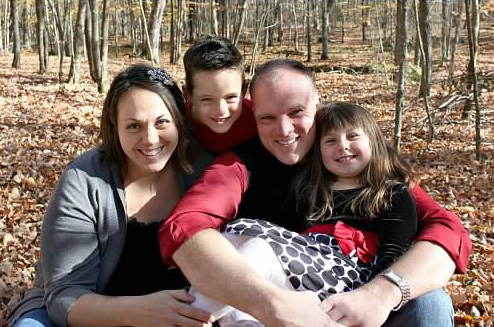“Diva” Daughter Deepens Appreciation for Newborn Screening
By Jan Klawitter, WSLH Public Affairs

Henry and Lucy Zaleski with their dog Chubbs.
As a certified genetic counselor, Christina Zaleski has met with many parents through the years explaining the implications of their babies’ newborn screening (NBS) test results. But in 2008 when she received the call about her daughter Lucy’s positive test results for congenital hypothyroidism (CH), the confident counselor became the frightened parent.
The Zaleski’s – Christina, husband Brian, son Henry and Lucy – live in central Wisconsin. Henry, who is two years older than Lucy, had normal newborn screening results. So, when an on-call pediatrician called to tell her about Lucy’s results, Christina was shocked.
“When I first got the call, I was home alone with Lucy and the laundry list of disorders on the NBS test panel raced through my head as I tried to listen and process the information being presented in a very short phone call,” Christina explains. “I was overwhelmed with worry, guilt, fear, and a sense of urgency. I remember rapid firing ‘what if’ and ‘what next’ questions trying to regain a sense of control over the situation. When I hung up the phone, I started to do my own research. Google and PubMed searches were not my friend as I convinced myself that this was the tip of the iceberg and that the floor was going to fall out from below me with more bad news. I panicked. I cried. I worried.”
Ironically, congenital hypothyroidism was one of the disorders on Wisconsin’s newborn screening panel that Christina was least familiar with. It’s caused by low thyroid hormone levels. Untreated, it can cause intellectual disabilities and slow physical growth. About one in every 3,000 to 4,000 babies born in the United States has CH. Twice as many girls have CH than boys.
A couple of days after the fateful phone call, Lucy underwent further tests to confirm the diagnosis. Christina also had her own thyroid hormone levels checked to make sure Lucy didn’t have a transient condition due to Christina’s thyroid. Lucy’s test result showed that her thyroid gland was only half developed and she began treatment immediately – before she was even 1 week old.
Christina admits that the first few weeks after Lucy’s diagnosis were difficult and full of worry.
“Nursing around the clock coupled with post-partum hormones, parenting a toddler at home, and knowing the importance of treatment and what was at stake, led to me crying, worrying and obsessing about getting Lucy to take the right amount of Synthroid (a synthetic thyroid hormone replacement) at the right time and then making sure she kept it all in,” Christina said. “While logically I knew this wasn’t my fault, emotionally I felt guilty and sad that my baby would have a lifelong medical issue on her plate. It didn’t seem fair, yet I knew that it could be so much worse. I worried about her having an underlying genetic syndrome (in which hypothyroidism was only a small piece). I worried about the blood draws and how she would hate them, and I worried about keeping her levels therapeutic. I worried about her future and if her development would be on track.”
Reaching out to other parents of children with CH was key to helping Christina and Brian understand that Lucy’s condition and treatment were manageable.
“Lucy’s pediatric endocrinologist was out of town that first few days so I did not have a local ‘expert’ to turn to, but I used my connections and found a father and an expert from another healthcare system who happened to have a child with the same condition. That individual, a pediatric neurologist friend and another mother (neurology nurse) helped me adjust more than anything else,” according to Christina. “Hearing their stories, getting practical advice on how/when to take the medicine and having a ‘plan’ for monitoring her condition helped to regain a sense of control and hope. They talked about their families and how this wasn’t such a big deal. While I knew that every child was unique, learning that their children with the same condition were the brightest and tallest, well-adjusted kids in their class provided me a sense of hope that I desperately needed. With accurate medical information, a plan, and a lot of reassurance, a sense of hope followed.”
Today Lucy is a soon-to-be 6 year old “diva” according to Christina. She loves dresses and nail polish and runs a “beauty salon” out of her bedroom. She plays sports (basketball, volleyball and hula hooping), loves reading and is a grade level ahead in math. She is also a budding entrepreneur selling painted rocks and lemonade in her neighborhood.
“Her growth is normal, she is bright and vibrant and full of spirit. She takes Synthroid every morning, waits 30 min for breakfast and lives her life,” Christina says admiringly. “Her sprightliness brings a smile or a chuckle to all those that cross her path. She is quite the kid.”
In addition to her daily Synthroid pill, Lucy also has blood tests every 6 months to check her thyroid levels. While she’s not thrilled with the blood draws, she loves the hot chocolate she and Christina get at the clinic afterward.
Christina and Brian have explained Lucy’s condition to her, telling her that when she grew inside Christina’s belly her thyroid didn’t form all the way.
“She knows that everyone is different and that her thyroid doesn’t make the hormones that her body needs to grow, so she takes hers in a pill form every morning,” said Christina. “I think she accepts that this is what she needs to do to grow. She doesn’t really know anything different. The rest of us have adjusted well too.”
Being a genetic counselor, Christina has always appreciated the value of newborn screening. But her family’s first-hand experience deepened that appreciation into gratitude.
“Wisconsin’s newborn screen allowed Lucy to get diagnosed and treated so that all ill consequences were prevented. We have a healthy, vibrant kid who, if she would have been born 50 years ago, may not have been so lucky,” Christina reflects. “When I first got that phone call, the historical images of kids who are mentally retarded with untreated CH were burned in my head. I want to tell our story so that those images can be replaced with hope for children born and diagnosed today.”
As for the Zaleski’s advice for other families —
“Ask questions. Reach out to friends and family, but also the experts, such as genetic counselors, and other parents. It’s OK to feel like you’re on an emotional roller coaster. Take one day at a time. And, most importantly, know that you aren’t alone.”

Christina, Henry, Brian and Lucy Zaleski
About Wisconsin’s Newborn Screening Program
Newborn screening is a special blood test for newborns. Babies born in Wisconsin are currently screened for 44 rare, serious, hidden disorders that, if not treated quickly, can lead to severe health problems and sometimes even death. Just a few drops of blood from a newborn baby’s heel are put onto a special test paper and sent to the Wisconsin State Laboratory of Hygiene to be tested. Babies also have their hearing and hearts screened at the hospital before going home, or by a midwife if born at home. The program is administered by the Wisconsin State Laboratory of Hygiene at the University of Wisconsin-Madison and the Wisconsin Department of Health Services.
To learn more:
Wisconsin State Laboratory of Hygiene Newborn Screening Laboratory – https://www.slh.wisc.edu/clinical/newborn/
Wisconsin Department of Health Services Newborn Screening Program – https://www.dhs.wisconsin.gov/cyshcn/newbornscreening.htm